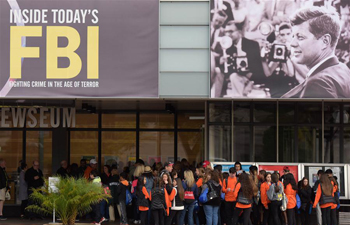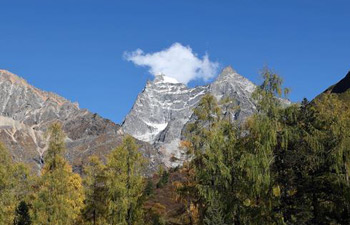BAGHDAD, Oct. 27 (Xinhua) -- The spokesperson of U.S.-led coalition on Friday denied a cease-fire has been reached between the Iraqi force and the Kurdish Peshmerga forces, retreating from his earlier announcement of cease-fire between the two sides.
"I incorrectly said in an interview with (Kurdish TV) Rudaw English there was a cease-fire between Iraqi and Kurdish forces," Colonel Ryan Dillon, spokesperson for the international coalition said in a tweet in the official page of the coalition.
"Both parties talking with one another but not an official cease-fire," Dillon said, adding that the coalition is encouraging dialogue.
Earlier in the day, Dillon told Rudaw Kurdish television "what we know is that there is a cease-fire," and the coalition wants the cease-fire to be extended so that the two sides will "refocus" on the fight against the terrorist Islamic State (IS) group in Iraq.
The coalition is "encouraging dialogue, through trying to get the right people from both Peshmerga and the Iraqi security forces. So that something could be worked out diplomatically," Dillon told Rudaw television.
Dillon's comments came a day after heavy clashes between the two sides on Thursday as the government troops advanced to seize more disputed areas outside the semi-autonomous region of Kurdistan.
Heavy clashes erupted in Rabi'a and Zummar areas as the troops advanced towards the village of Faysh-Khabur near the Iraqi-Syrian-Turkish border to seize the border crossing point of Ibrahim al-Khalil between Iraq and Turkey.
More clashes occurred during the day on the main road outside the town of Makhmour, some 60 km southwest of Erbil, between the security forces and Kurdish Peshmerga, the source said.
The two sides also traded mortar and artillery barrage in Altun Kupri, some 40 km north of the city of Kirkuk.
On Oct. 16, Iraqi Prime Minister Haider al-Abadi ordered government forces to enter the oil-rich Kirkuk province in northern Iraq to regain control of the ethnically-mixed disputed areas.
The Kurds consider the northern Kirkuk province and parts of Nineveh, Diyala and Salahudin provinces as disputed areas and want them to be incorporated into their region, a move fiercely opposed by the Arabs and Turkmens in the region as well as the Iraqi central government.
Tensions have been running high between Baghdad and the region of Kurdistan after the Kurds held a controversial referendum on the independence of the Kurdistan region and the disputed areas.

















